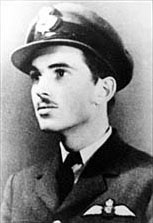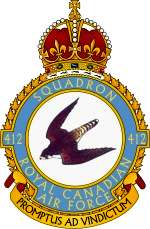High Flight… Near Tangmere, England December 11th, 1941 "The Surly Bonds of Earth..."  John Gillespie Magee Junior was born, to Episcopalian missionary parents, in Shanghai, China, in 1922 - the oldest of four sons. His father was American, and his mother was English. He learned to speak Chinese before English, and was educated at the Rugby school in England and at Avon Old Farms School in Connecticut. He won a Scholarship to Yale, but instead joined the Royal Canadian Air Force in late 1940, trained in in Toronto, Ontario, and passed his Wings Test in June 1941. Shortly after being awarded his Wings and being promoted to Pilot Officer, Magee was sent to Britain and was posted to No. 53 Operational Training Unit in RAF Llandow, Wales, to train on the Supermarine Spitfire. John Gillespie Magee Junior was born, to Episcopalian missionary parents, in Shanghai, China, in 1922 - the oldest of four sons. His father was American, and his mother was English. He learned to speak Chinese before English, and was educated at the Rugby school in England and at Avon Old Farms School in Connecticut. He won a Scholarship to Yale, but instead joined the Royal Canadian Air Force in late 1940, trained in in Toronto, Ontario, and passed his Wings Test in June 1941. Shortly after being awarded his Wings and being promoted to Pilot Officer, Magee was sent to Britain and was posted to No. 53 Operational Training Unit in RAF Llandow, Wales, to train on the Supermarine Spitfire.
There, he was further trained on the Spitfire by Pilot Officer Michael Henry Le Bas, a native of Argentina: “During our acquaintanceship, he had always maintained that his first love was poetry, although he had discovered that flying was not far behind. He was thus able to imbue his flying with a sense of lyricism.” "Danced the Skies..." On August 18th, 1941, Magee had flown up to 33,000 feet in a Spitfire Mk I, his seventh flight in a Spitfire. As he orbited and climbed upward, he was struck with the inspiration of a poem - "To touch the face of God." Le Bas recalled “I happened to run into him shortly after his first flight in a Spitfire about which he was waxing lyrical. I urged him, though not very seriously, that since he had always wanted to be a poet he should put his feelings down in words. He thereupon sat down in the mess and composed, in a very short time, the first draft of "High Flight" written, literally, on the back of an envelope.” Magee completed the poem later that day after landing. Magee proceeded to write a letter, dated September 3rd, 1941, to his parents. In it, he commented, "I am enclosing a verse I wrote the other day. It started at 30,000 feet, and was finished soon after I landed." On the back of the letter were the words to his poem, entitled 'High Flight'. "High Flight" - Oh! I have slipped the surly bonds of Earth
- And danced the skies on laughter-silvered wings;
- Sunward I’ve climbed, and joined the tumbling mirth
- of sun-split clouds, — and done a hundred things
- You have not dreamed of—wheeled and soared and swung
- High in the sunlit silence. Hov’ring there,
- I’ve chased the shouting wind along, and flung
- My eager craft through footless halls of air....
- Up, up the long, delirious, burning blue
- I’ve topped the wind-swept heights with easy grace
- Where never lark nor even eagle flew—
- And, while with silent lifting mind I’ve trod
- The high untrespassed sanctity of space,
- Put out my hand, and touched the face of God.
At the conclusion of his Spitfire training, he was assigned to the No 412 (Fighter) Squadron of the RCAF that summer, intercepting German bombers bound for British factories and population centers. He saw his first combat on November 8th, and scribbled another poem, entitled "Per Ardua" - a reference to the Royal Air Force's motto - "Per ardua ad astra". "Footless Halls of Air..." On December 11th, 1941, (only three days after the US entered World War II) during a routine training mission while flying over Tangmere, England, at about 400 feet above the ground at 11:30. Magee was descending in the clouds. There, his Spitfire mark IIa, serial number AD291 and marked as VZ-H, collided with an Airspeed Oxford piloted by a student, LAC Ernest Aubrey Griffin, a Royal Air Force Volunteer Reserve pilot from RAF Cranwell. At the inquiry afterwards, a farmer testified that he saw the Spitfire pilot struggling to push back the canopy. The pilot stood up to jump from the plane but was too close to the ground for his parachute to open and died instantly Both pilots were killed and later buried at the village church at Holy Cross, Scopwick Cemetery in Lincolnshire, England.. Magee’s headstone includes the first and last lines of his “High Flight” poem. "Touched the Face of God..." Part of the official letter to Magee's parents read, "Your son's funeral took place at Scopwick Cemetery, near Digby Aerodrome, at 2:30 P.M. on Saturday, 13th December, 1941, the service being conducted by Flight Lieutenant S. K. Belton, the Canadian padre of this Station. He was accorded full Service Honors, the coffin being carried by pilots of his own Squadron." Magee’s parents lived in Washington, D.C., at the time of his death, and the sonnet came to the attention of the Librarian of Congress, Archibald MacLeish. He acclaimed Magee the first poet of the War, and included the poem in an exhibition of poems of "faith and freedom" at the Library of Congress in February 1942. Pilot Officer Le Bas would continue in the military, being knighted in 1966, and retire from the Royal Air Force in 1972 as a Air Vice-Marshal. |
